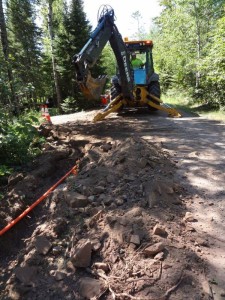County seeks millions more for taxpayer-funded Internet

By Tom Steward/Watchdog Minnesota Bureau
One of the biggest, most expensive and controversial stimulus broadband Internet projects in the country would get another $20.5 million shot of taxpayer funding from the Federal Communications Commission, if Lake County officials get their way.
“We’re saying, hey, if they have extra dollars at the FCC, we’d hope that they could help fund continuing building out our drops in these rural areas,” Lake County Administrator Matt Huddleston said.
Or the feds could side with private-sector competitor Mediacom’s claim the sparsely populated northern Minnesota county is going “back to the government trough in search of tens of millions more in taxpayer money to prop up a project that should never have been funded in the first place.”
The application for more federal funding reignited a years-long running battle between Lake County and private providers that already operate in areas where tax dollars will fund the competition. The $70 million Lake Connections voice, video and data network remains a year behind schedule with the first subscribers soon to be connected.
“Yeah, we’ve had some setbacks and all their arguments they want to throw out there it’s like, you’re saying the same things,” Huddleston said. “We’ll get there to have that debate, once we get this thing laid out this year and start hooking people up.”
“This is an ‘I told you so’, I just can’t believe it was ever approved,” said Tom Larsen, Mediacom group vice president of legal and public affairs.
In 2011, Lake County received $66.5 million in stimulus broadband Internet funding — mostly loans — from the Rural Utilities Service to provide fiber service to 16,000 homes and businesses, crossing large swaths of national forest there and adjoining St. Louis County.
READ THE FCC APPLICATION AND MEDIACOM LETTER HERE.
“Lake County assured the RUS in its application that the funds it sought (and received) would be sufficient to build and operated the Project. Now that the County’s projections have been proven woefully inaccurate, the County blames its shortfalls on deficiencies of the RUS grant,” Larsen wrote in a letter to the House Commerce and Energy Committee that has been investigating RUS stimulus projects.
While county taxpayers kicked in $3.5 million, residents also eventually could be on the hook for $56.5 million of low-interest RUS loans. Lake County asked the FCC for the additional federal dollars in the form of a $17.5 million construction grant to expand the potential number of subscribers. The other $3 million grant would go toward operating the system upon completion in 2015.
“We want to be on par with the grants that other people received for their projects in a high cost area like we’re in,” Huddleston said. “… So we’re seeking additional grant dollars to help with that. We’re not saying we can’t get the project done.”
The county’s March application, however, acknowledges the fiber network, which is still under construction, faces higher costs and technical challenges than anticipated.
“The BIP (Broadband Initiatives Program) funds do not cover the cost of the build. While the estimated average cost to build to each customer was approximately $3,500, the RUS (Rural Utility Service) grant amounts to about $585 per customer,” states the Lake County application.
Just finding poles to position the cable on turned out to be a problem, further driving up costs by forcing more fiber to be buried.
“Aside from the geological challenges of building in the area, one cause of cost increase is a result of attempting to hang fiber on utility poles owned by electric cooperatives and municipalities, which the FCC does not regulate,” according to the county document. “These cooperatives required a level of utility pole make readies that have effectively drive the project from an aerial build to the more expensive buried.”
DIGGER DEEPER HOLE? Lake County broadband network project faces higher costs than expected in an area of vast wilderness and low population. Lake County photo.
Larsen wrote to committee investigators that “the project was doomed to fail.”
“It is a convenient excuse for Lake County to cite geological challenges and pole attachment issues as the reasons behind the Project’s deficiencies. However, these issues existed before Lake County every applied to the RUS. Anyone with even a remote knowledge of how telecommunications networks work would have taken these issues into account before filling out the application. The fact is the RUS handed over more than $66 million in taxpayer money to a group of amateurs,” Larsen wrote.
About 60 percent of potential subscribers will have access to the Lake Connections system under the original RUS stimulus funding.
“It’s a business plan like any other business,” Huddleston said. “It’s modeled on certain assumptions, and we’re going to do our damnedest to make sure those things happen.”
Contact Tom Steward at tsteward@watchdog.org.







